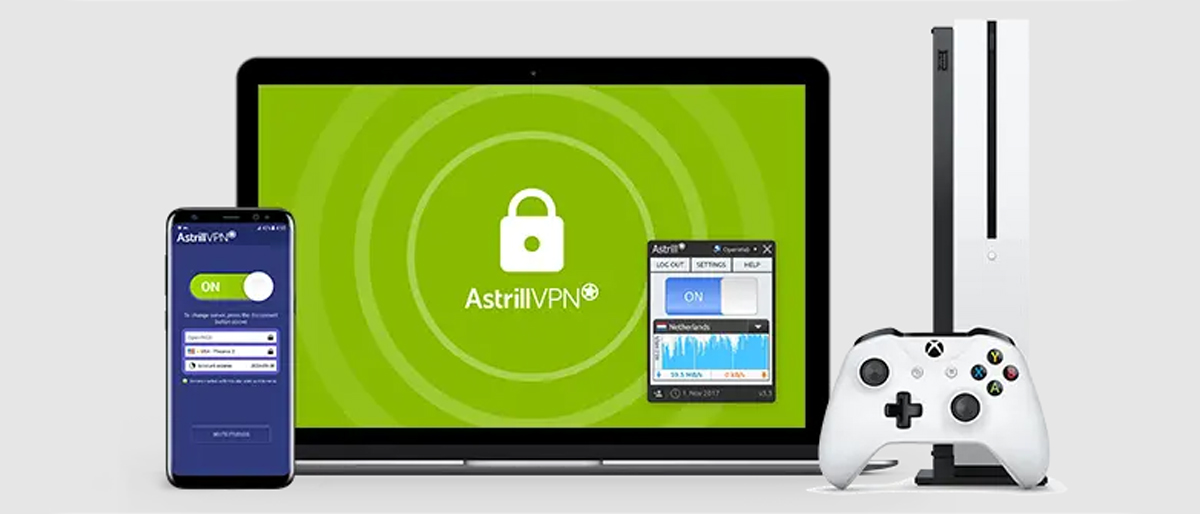Tom's Guide Verdict
Astrill VPN has some awesome expert features and customizability, and can even help you connect to places (like China) that other services struggle with. However, the apps have their issues, it's not a great pick for streaming, and it's incredibly expensive compared to the competition.
Pros
- +
Tons of low-level features and customization
- +
Unblocks Netflix US and UK, and BBC iPlayer
- +
Decent free Android plan
- +
Stealth VPN to evade censorship in China
- +
7-day trial
Cons
- -
Very expensive
- -
Users may have to hand over their phone number and address during registration
- -
Kill switch isn't wholly reliable
- -
Usability problems
- -
Some apps haven't been updated for a long time
- -
Can't unblock Amazon Prime or Disney Plus
- -
No money-back guarantee or refund
- -
Service has not been audited
- -
Mobile offerings are limited
Why you can trust Tom's Guide
Astrill VPN has carved out a reputation across online communities (like Reddit and tech forums) for its customizability, unblocking power, and ability to access otherwise censored internet in China.
Registered in Liechtenstein, Astrill VPN runs a small network of over 300 servers in 113 cities and 57 countries. That's not a huge amount, especially compared to the very best VPN services out there, but it's no reason to discount Astrill VPN entirely. The provider claims that its servers are all speedy (which isn't that unusual) and that there are even 20 Gbps servers in a handful of 'key locations.'
In this review, I'll take the magnifying glass to Astrill VPN's features, apps, and customer support, and see how it stacks up against the other top dogs in the industry. So, keep reading to learn more, and use the navigation menu to hop to any section that takes your fancy.
Astrill VPN on paper
| Number of servers | 300+ | Row 0 - Cell 2 |
| Server countries | 57 | Row 1 - Cell 2 |
| Supported platforms | Windows, Mac, iOS, Android, Linux, routers | Row 2 - Cell 2 |
| Simultaneous connections | 5 | Row 3 - Cell 2 |
| Split tunneling | Yes | Row 4 - Cell 2 |
| Kill switch | Yes | Row 5 - Cell 2 |
| Protocols supported | OpenVPN, WireGuard, StealthVPN | Row 6 - Cell 2 |
| Country of registration | Liechtenstein | Row 7 - Cell 2 |
| Support | Live chat, email, knowledgebase, video tutorials | Row 8 - Cell 2 |
Astrill VPN 1-minute review
You'll be able to use Astrill VPN on just about any device. There are apps for Windows, Mac, iOS, Android, Linux, and DD-WRT and Asus Merlin routers. This is great coverage, and I'm glad to see that P2P traffic is supported across the majority of Astrill VPN's servers. Onion over VPN support gives you an added layer of protection, too.
Astrill VPN also spoils users for choice when it comes to protocols. Take your pick of speedy WireGuard, OpenVPN for all-around security, or the provider's very own StealthVPN for help connecting to even the most anti-VPN locations (like China.)
Features range from the low-level to the technical
There are tons of features to play with, ranging from the low-level to the more technical. Port forwarding is a must-have for torrenters looking to speed up their downloads, and you can use the Multi-hop VPN to route your traffic through an additional VPN location to throw snoopers off your trail. VPN sharing is another handy extra that'll let other devices on your network access Astrill VPN's protection.
It's worth noting that Astrill VPN's website says that the service supports unlimited devices – but it's not true. You can install the VPN on as many devices as you want, which is nice, but you'll only be able to use five of them at the same time. That's probably enough to cover most of your devices, but the likes of Surfshark, IPVanish, and AtlasVPN all make good on their promise of unlimited simultaneous connections.
In terms of recent updates, there's not much to report. The Astrill VPN Android app was updated a few months ago, although the last iOS release was back in 2019. The provider also hasn't updated its desktop apps since 2020 – which isn't encouraging. Typically, I like to see providers staying on top of maintenance and potential vulnerabilities by pushing out small, regular updates to WireGuard and OpenVPN.
▶ Want to learn more? Check out the Astrill VPN homepage
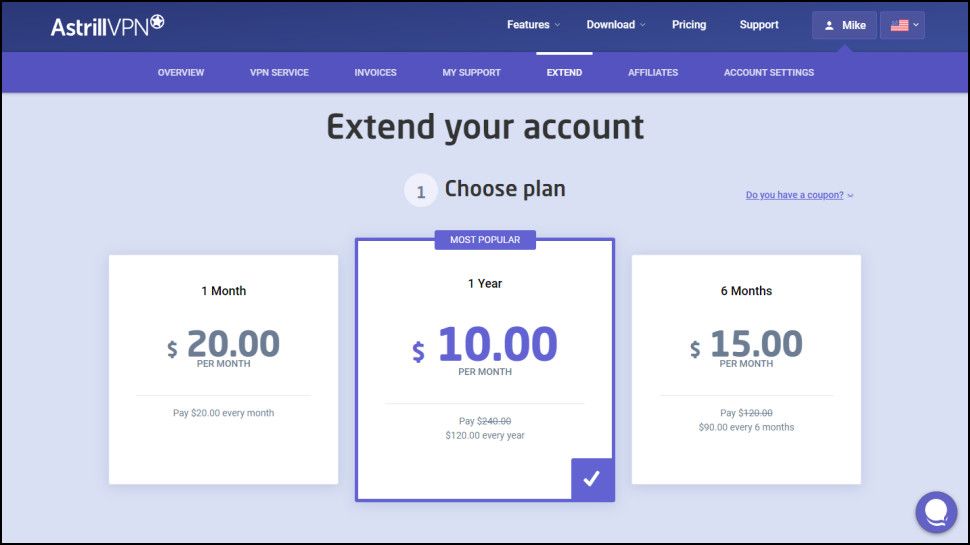
Astrill VPN price and payment
| Plan length | Overall cost | Monthly cost |
|---|---|---|
| 1 month | $30.00 | $30.00 |
| 1 year | $180.00 | $15.00 |
| 2 yeears | $300.00 | $12.50 |
If you're looking for a cheap VPN, Astrill VPN certainly does not fit the bill. At $30 a month, or $15 a month on the annual plan, it's just about the most expensive service I've tested.
What's more, you're not even getting a premium product for a premium price. If you want maxed-out speeds, reduced latency for gaming and clients in Asia, 'prioritized traffic', and the multi-hop feature, you'll have to drop an extra $10 a month on the optional VIP add-on. You won't get a discount on that price for signing up for a long-term plan, either, which brings the annual plan up to $25 a month.
So, if you shell out $180 for Astrill VPN (or $300 with the VIP add-on), you'll be covered for a year. Compared to PIA, which charges $79 for three years of coverage (with three months extra thrown in as a sweetener), it really puts into perspective how expensive Astrill VPN is.
However, Astrill does offer a free Android VPN, which supports one device and delivers limited speeds. It's not the best free VPN in the world, but it's worth checking out to make sure you like the product.
I also struggled to complete my purchase with PayPal – which is my preferred payment method when it comes to test account fees. I tried a dozen times, and Astrill VPN's site told me over and over that my attempt had failed. I can't say why Astrill VPN is the only service out of the twenty in our latest updates where this was a hiccup – but it's something I hope to see straightened out.
Luckily, there were plenty of alternative methods to choose from, including card, Bitcoin, AliPay, WebMoney, Union Pay, and Web Money.
If you're feeling cagey about forking over a small fortune to Astrill VPN, you can check out the 7-day free VPN trial without sharing any payment details. Just be aware that the service doesn't offer any refunds or a money-back guarantee.
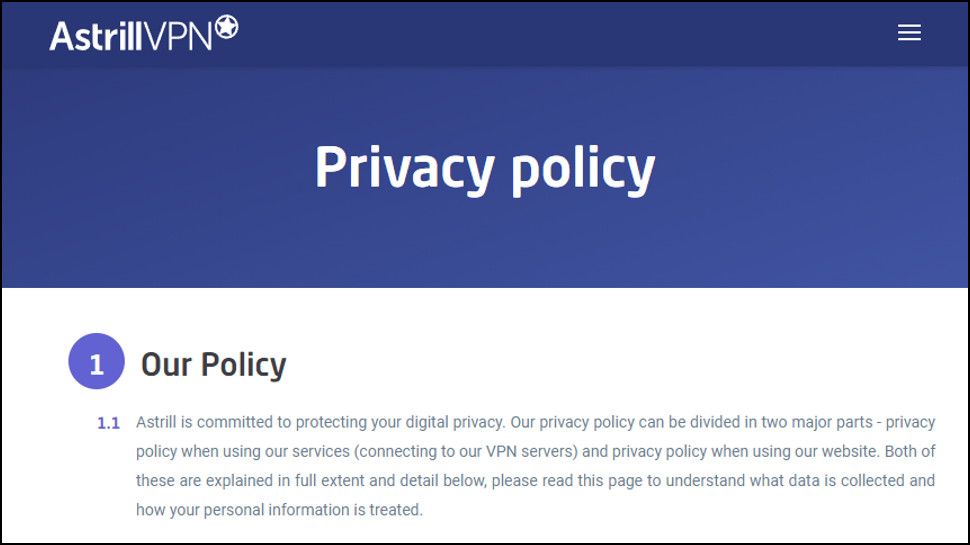
How private is Astrill VPN?
Unlike many smaller VPNs, Astrill VPN offers a clear and well-written privacy policy that not only lays out what information it doesn't collect, but also what it does – and that transparency goes a long way in terms of credibility.
In terms of logging, Astrill VPN plainly states: 'Our system keeps track of active sessions – connection time, IP address, device type and Astrill VPN application version during the duration of your VPN session. Once you disconnect from VPN this information is removed permanently from our system.'
So, a small amount of collection, but no logs are stored after the fact. Good stuff.
Currently, Astrill VPN has not undertaken an audit
Astrill VPN also collects the 'last 20 connection records which include: connection time, connection duration, country, device type, and Astrill client application version number'. These, however, can't be tied back to your activity thanks to the fact the provider doesn't store users' IP addresses anywhere in the chain.
Claims and promises can be fallible, however, which is why I always double-check whether a VPN is actively using trackers. I only found one on the Astrill VPN website, which is better than most, and not a single third-party cookie. The Android app was just as clean – Exodus couldn't spot any trackers at all.
While that's good news on the logging front, a closer look at the privacy policy revealed that the company might ask for your mobile number and address when you sign up, in addition to your email and name. I saw this for myself when the Astrill VPN site requested verification via my mobile phone before I completed my Bitcoin payment... which is incredibly counter-intuitive for a VPN that claims to champion privacy.
It's also disappointing that Astrill VPN hasn't undertaken a third-party audit of its logging policy. Without one, you're required to put a lot of faith in the service, trusting that it won't misuse your data, as there's just no way to verify its claims. All in all, it's a lot to ask.
What protocols does Astrill VPN use?
There's a decent range of protocols on offer, including WireGuard, OpenVPN, OpenWeb, and StealthVPN – the latter two being Astrill VPN creations.
OpenWeb is designed to deliver better browsing speeds and by default only affects traffic from what it deems to be the most popular web browsers. These include Google Chrome, Chromium, Opera, Safari, Firefox, and Internet Explorer – and yes, Edge is missing from the list. You can add it yourself, if you want, but I have to wonder why Astrill VPN is working with such outdated assumptions about the browsers we're using.
StealthVPN is what makes Astrill a good pick as a China VPN. While I couldn't check this myself, StealthVPN is 'even more secure and hard to identify and block by firewalls', and from reports I've seen online, it seems to do the job.
In terms of encryption, you'll get AES-128-CBC by default with OpenVPN, although you can crank that up to AES-256 if you want to feel really secure. Encryption is also bypassable, which means sacrificing any privacy benefit for better speeds – useful perhaps for streaming, or spoofing your location for gaming.
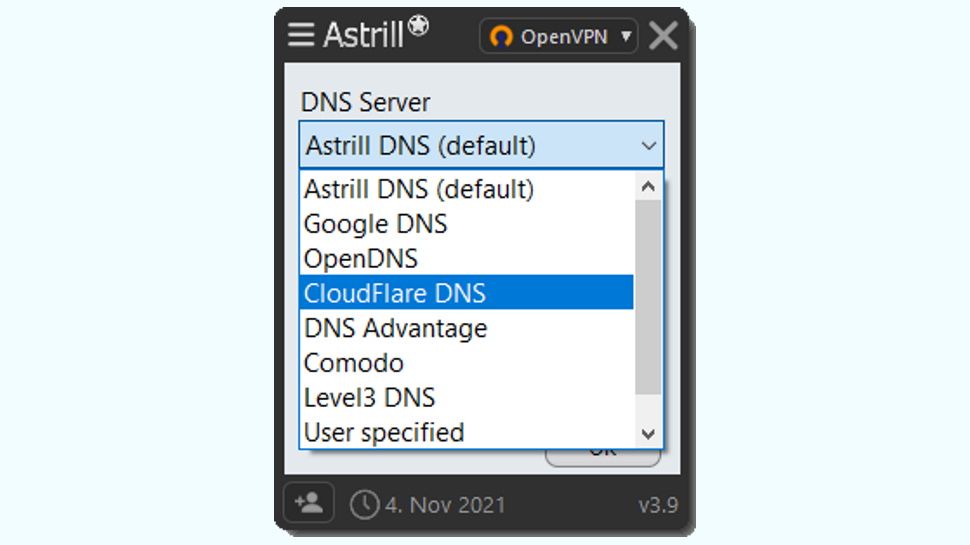
What settings and customizations does Astrill VPN offer?
Astrill VPN's customization is where it starts to justify its high price (a bit). Head into some menus in-app and you'll have a plethora of options to fiddle with.
You'll be able to customize encryption, change ports, adjust MTU settings, and plenty more. Plus, the split tunneling feature is powerful, effective, and available alongside both kill switches.
Like most good VPNs, Astrill VPN runs its own DNS network to keep your traffic out of the hands of third parties. Unusually, though, you can choose not to use this network and instead go through Cloudflare, Google DNS, OpenDNS, and a few more too.
All this simply scratches the surface of Astrill's incredible range of features, and if you're keen on really digging into your software to customize it exactly how you want – and have the nouse to do so – it should offer plenty to keep you occupied. For the uninitiated, though, it might just be too much to take in.
How fast is Astrill VPN?
| Protocol | Test result | Header Cell - Column 2 |
|---|---|---|
| OpenVPN | 275 Mbps | Row 0 - Cell 2 |
| WireGuard | 275 Mbps | Row 1 - Cell 2 |
Oddly enough, I wasn't able to get Astrill VPN working with my regular speed test environment. I didn't anticipate this, but as a Cloud PC in a data center isn't a platform I'd expect Astrill VPN to support, it's not something I'm going to hold against the company.
Using a 5G modem that can reach 300 Mbps, I was pretty impressed by Astrill VPN's performance. OpenVPN and WireGuard speeds hit 200 to 275 Mbps, which is more than capable of handling any browsing, streaming, and gaming. There are a lot of fast VPNs out there, however, like NordVPN and IPVanish, that can reach almost double these speeds.
How good is Astrill VPN for streaming?
| Netflix | Working (UK, US) |
| Prime | Working |
| YouTube | Working |
| iPlayer | Working |
| 10Play | Not working |
| 9Now | Working |
| ITV Player | Working |
| All4 | Working |
Astrill VPN doesn't market itself as a streaming VPN, which doesn't bode well – but in a time where we see a huge amount of bogus claims about VPNs unblocking every streaming site under the sun, it's quite refreshing to see a provider be honest.
What's more, Astrill VPN is perfectly capable of unblocking exclusive US Netflix content from outside the country. Since Netflix cracked down on VPN use in mid-2021, we've seen a ton of reliable Netflix VPN services run into trouble, so this is a great result for Astrill VPN.
Bear in mind that Astrill VPN doesn't have specialist locations for accessing the likes of Netflix and Amazon Prime, which can make it difficult to unblock particular sites. You might have to employ some trial and error with different server locations to find one that actually works.
Luckily, I was able to browse through US Netflix via all three of my test locations. I also unblocked a range of UK favorites, including Netflix, BBC iPlayer, ITV, and Channel 4.
Astrill VPN had less success with Netflix Australia, Canada, and Japan, and couldn't unblock Australia's 10Play – though it did manage to open up 9Now.
We wouldn't recommend Astrill VPN if your main reason for getting a VPN is to access more content, but Netflix unblocking is definitely a nice extra to have in your back pocket. If you want something more reliable, however, ExpressVPN, NordVPN, and Surfshark all scored top marks when it comes to unblocking in our latest tests.
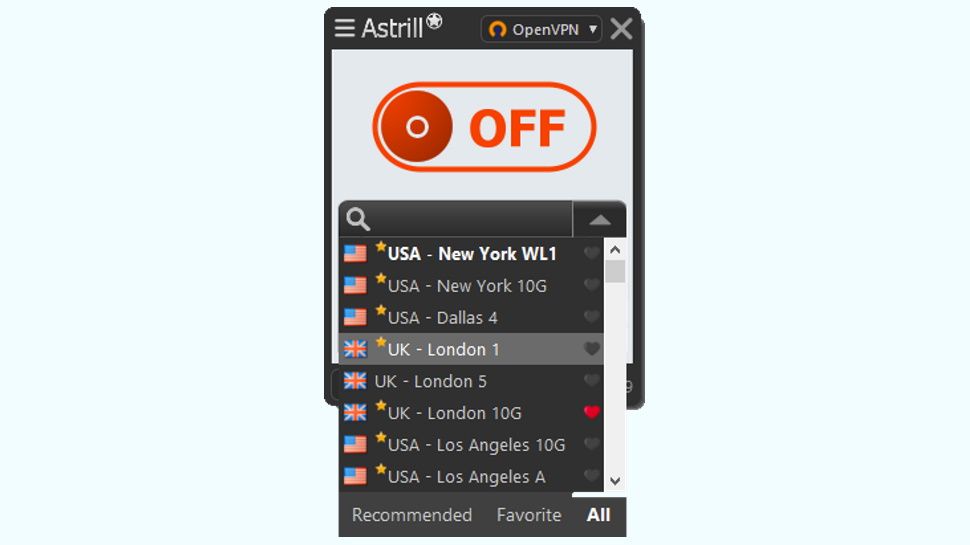
How good are Astrill VPN's apps?
Astrill VPN's apps offer tons of extra features, but on the surface they look quite dated. However, that's mostly an aesthetic issue, and installation is a breeze.
However, as we mentioned earlier, signing up for Astrill VPN is a lengthy process. You'll be asked to verify your phone number (with an SMS PIN) if you sign up for the free trial, and hand over your email address if you pay via PayPal. Even downloading the VPN is overly complex, seeing as you'll need to sign in and complete a CAPTCHA – other services only require you to click a link.
The first thing you'll notice about Astrill VPN's Windows client is just how simple it is. There's an On/Off button, network activity graph, and the name of your current location. Dig a little deeper, however, and you'll see that there's more to the app than meets the eye.
Click on the server drop-down and you'll be able to scroll or type to find a server. I'm glad that there's a search box here, because there seems to be no rhyme or reason to Astrill's ordering of its servers. And, while you can find explanations in the annals of Astrill's site, the names of servers themselves offer very little usable information. I imagine most users will pick servers at random.
Simple apps hide a wealth of customizable features
As it turns out, any server marked with an asterisk is P2P-friendly, which is good to know – but not something that you'll understand right off the bat. It'll take time to understand Astrill VPN's quirks and get the most out of its software.
The Recommended tab sounds great on paper, but from my UK test base, I was offered Seattle, New Zealand, Japan, and Hong Kong. Hardly on my doorstep. The Favorites tab is a useful addition, however.
You'll also get split tunneling, which can protect certain apps or sites – perhaps your torrenting client or a particular game – and leave others to use an unprotected connection.
Astrill VPN offers two kill switches – one app-specific and one global. Both are effective in regular use, although when I stress-tested it, the global switch came a little undone.
Simply ending the OpenVPN process triggered it, protecting me until the app reconnected. However, when I force-closed the app when using WireGuard, it didn't activate. I undertook the same attack when using OpenVPN and the VPN stayed active, but when I reopened the app it lost connection, and the kill switch didn't kick in.
The mobile offerings are a little less impressive, with very few features. The iOS VPN is pretty much just an on/off button with server selection and a choice of UDP or TCP protocols. It does, however, have a Favorites tab that we'd love to see in the desktop version, alongside a Recents tab.
The Android app is a little better with split tunneling, OpenWeb, Stealth VPN, and WireGuard, plus port information. So, it's a little more powerful, but, for some reason, lacks the useful Favorites and Recents tab.
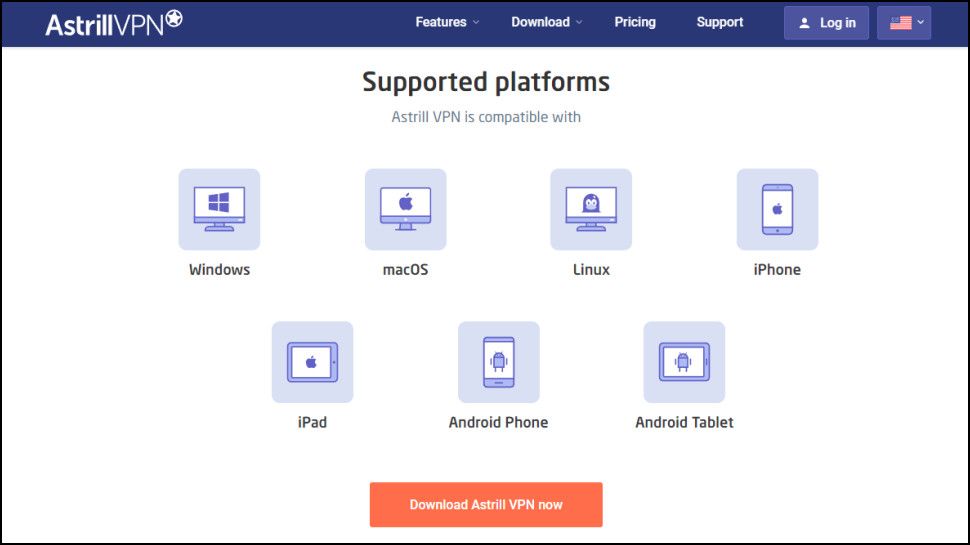
Astrill VPN: Final verdict
As far as consumer VPNs go, Astrill VPN offers just about as much configuration as I've seen – and for those who'll make the most of it, that will be a big plus. The fact that it's put the effort into unblocking the web in China is excellent to see, too, but Astrill VPN certainly has its fair share of problems.
Issues with the kill switch, a dated design, weak streaming support, and sky-high prices mean that it's not a strong contender for anyone who doesn't need to bypass firewalls. Instead, I'd recommend ExpressVPN for all-round usage, Surfshark for rock-bottom prices, and NordVPN for ultimate speeds.
Tom's Guide rating: ⭐⭐½
Subscribe if:
✔️ You're a Netflix fan. Astrill VPN was able to access the UK and US Netflix libraries in just a few clicks - which is good news if you keep up with all the latest releases.
✔️ You want to beat anti-VPN censorship. Thanks to its StealthVPN protocol, Astrill VPN can help you access sites and services in China.
✔️ You'd like to try before buying: Although there's no money-back guarantee on offer, you can put Astrill VPN to the test with a 7-day free trial.
Don't subscribe if:
❌ You have broader streaming interests. Unfortunately, Astrill VPN couldn't unblock the Australia, Canada, and Japan Netflix libraries, or 10Play.
❌ Transparency is key. Handing over personal information when signing up isn't ideal and, without a no-logs policy, you'll have to take Astrill VPN at its word.
❌ You're looking for a bargain. Astrill VPN is pricey, there's no way around it, and other providers offer more unblocking power and longer subscriptions for much less.
| Feature | Comments | Rating |
|---|---|---|
| Design | Slightly outdated compared to other market leaders | ⭐⭐⭐ |
| Ease of use | Straightforward, though there's plenty to customize | ⭐⭐⭐⭐ |
| Performance | Average speeds, but enough to handle streaming and day-to-day browsing | ⭐⭐⭐ |
| Unblocking | Struggles to unblock Netflix libraries outside of the US and UK | ⭐⭐⭐ |
| Security and privacy | Strong encryption and stealth tools, but the kill switch has issues and there's no audit | ⭐⭐⭐ |
| Customer support | Live chat support is on hand to troubleshoot issues, and video tutorials are a handy resource | ⭐⭐⭐⭐ |
| Price | Incredibly pricey even without optional extras | ⭐⭐ |
How we test VPNs
Understanding how our team of experts tests VPNs is important. It lets you know that we really have got hands-on with these products, and that we’ve considered every feature, no matter how small. Some sites just give a rundown of specs found on a provider’s website – we endeavor to do quite a bit more than that.
First of all, we do check the provider websites, and note useful information like the number of servers and locations, whether you’re allowed to use every server for P2P, which encryption protocols are supported, the variety of operating systems it runs on, and tons more. We also check the pricing at this stage.
This initial scan gives us a baseline understanding of the service, and if there are any bold claims on-site we note them to make sure the customer isn’t being misled.
We’ll then dig into privacy policies. This is a very important piece of literature for any company, but for VPNs they need to be absolutely watertight. We’ll also go through the logging or zero-logging policy to look for gaps, and read any information available on independent audits.
Then it comes to testing the applications themselves. We test how easy it is to download and install, noting if any data collection options are clearly outlined to the user. We then inspect the default configuration to see what you have to ‘opt in’ for, and what features are available overall. We then play around with any additional features, such as ExpressVPN’s server speed test or NordVPN’s Double VPN. After we’ve gone through everything on the surface, the fun bit starts – trying to break things.
We throw all sorts of curveballs at these VPNs, like connecting to oddly configured networks, and killing processes to see if we can get the VPN to stop without activating the kill switch.
After we’ve had our fun, we check in with the support team to see if they’re helpful. Then, we’ll check a wide range of streaming sites to see if the VPN is able to access geo-blocked content, and we’ll run a series of speed tests over a few days and nights to get an accurate picture of what sort of connection speeds you can expect.


Mo has been rigorously testing, reviewing, and analyzing VPN services at Tom’s Guide for more than five years. He heads up the three-person Tom's Guide VPN team, and is passionate about accessibility: he believes that online privacy should be an option that’s available to everyone. NordVPN and ExpressVPN are the products he uses most on a daily basis, but he experiments weekly with all the top services, evaluating their privacy features, connection speeds across various protocols, and server reliability – among other things – so that he can make confident VPN recommendations that are backed by data. To see his latest advice, head over to Tom’s Guide’s best VPN and best free VPN guides.
